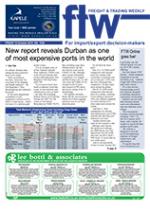The objectives of import
tariff amendments are
to promote domestic
production, job
retention and creation,
and international
competitiveness,
according to a statement
issued to FTW by the
chief commissioner of
the International Trade
Administration Commission
(Itac), Siyabulela Tsengiwe.
Various kinds of
custom duties and tariff
amendments are applied
by Itac during tariff
investigations, he added.
“Selective increases
in customs duties are to
grant relief for domestic
producers experiencing
threatening import
pressures,” Tsengiwe said.
“This allows them to adjust
and restructure so that,
in the medium- to longterm,
they can become
internationally competitive
without any support in the
form of customs duties.”
This is made possible
because there is a difference
between the applied rates
and the WTO-bound rates,
which acts as a ceiling
beyond which customs duty
increases cannot go.
Also, the tariff support
decided on is tied to
economic performance over
time – and is reviewed after
a specified period.
“Selective reductions
are also considered where
goods (consumption,
intermediate or
capital goods) are
not manufactured
domestically or unlikely
to be manufactured
domestically,” the
commissioner said.
It’s all based on
a strictly controlled
procedure. Comprehensive
criteria for adjudicating
tariff applications have
been set, and these are
consistently applied
across all sectors based
on information obtained
through comprehensive
questionnaires and on-site
verifications.
“The adjudication process
is rigorous and evidencebased,”
Tsengiwe said, “and
is carried out on a case-bycase
basis considering the
implications for the full
value chain.
“Also, in light of the
pressing challenge of
unemployment, the criteria
are applied in a manner that
is sensitive to employment
outcomes.”
Customs tariffs can
take the following
forms:
• Ad valorem duties;
• Specific duties;
• A combination of ad
valorem and specific
duties;
• Formula duties with
reference prices; and
• Variable tariff formulae
for selected agricultural
products.
In the SA tariff book
there is currently a total of
6 650 eight-digit tariff lines
– 115 formula or specific
duties; 81 specific duties; 8
variable tariff formulae; 3
254 attracting ad valorem
duties; and 3 192 duty-free.
Readers who feel they
have a case can obtain
customs tariff amendment
application forms from Itac’s
website – www.itac.org.za
Completed application
forms should be addressed to:
Chief Commissioner,
International Trade,
Administration Commission,
Private Bag x753, Pretoria,
0001.
Import tariff amendments in a nutshell
15 Oct 2010 - by Staff reporter
0 Comments
FTW - 15 Oct 10

15 Oct 2010
15 Oct 2010
15 Oct 2010
15 Oct 2010
15 Oct 2010
15 Oct 2010
15 Oct 2010
15 Oct 2010
Border Beat
17 Jun 2025
30 May 2025
